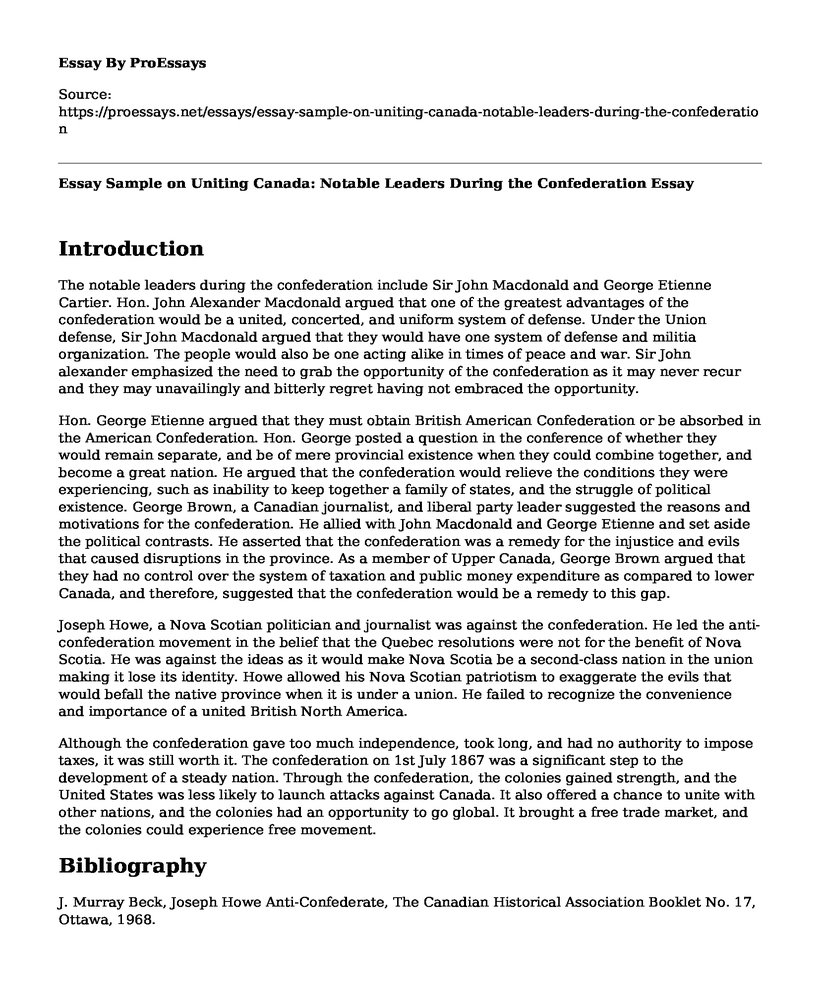Introduction
The notable leaders during the confederation include Sir John Macdonald and George Etienne Cartier. Hon. John Alexander Macdonald argued that one of the greatest advantages of the confederation would be a united, concerted, and uniform system of defense. Under the Union defense, Sir John Macdonald argued that they would have one system of defense and militia organization. The people would also be one acting alike in times of peace and war. Sir John alexander emphasized the need to grab the opportunity of the confederation as it may never recur and they may unavailingly and bitterly regret having not embraced the opportunity.
Hon. George Etienne argued that they must obtain British American Confederation or be absorbed in the American Confederation. Hon. George posted a question in the conference of whether they would remain separate, and be of mere provincial existence when they could combine together, and become a great nation. He argued that the confederation would relieve the conditions they were experiencing, such as inability to keep together a family of states, and the struggle of political existence. George Brown, a Canadian journalist, and liberal party leader suggested the reasons and motivations for the confederation. He allied with John Macdonald and George Etienne and set aside the political contrasts. He asserted that the confederation was a remedy for the injustice and evils that caused disruptions in the province. As a member of Upper Canada, George Brown argued that they had no control over the system of taxation and public money expenditure as compared to lower Canada, and therefore, suggested that the confederation would be a remedy to this gap.
Joseph Howe, a Nova Scotian politician and journalist was against the confederation. He led the anti-confederation movement in the belief that the Quebec resolutions were not for the benefit of Nova Scotia. He was against the ideas as it would make Nova Scotia be a second-class nation in the union making it lose its identity. Howe allowed his Nova Scotian patriotism to exaggerate the evils that would befall the native province when it is under a union. He failed to recognize the convenience and importance of a united British North America.
Although the confederation gave too much independence, took long, and had no authority to impose taxes, it was still worth it. The confederation on 1st July 1867 was a significant step to the development of a steady nation. Through the confederation, the colonies gained strength, and the United States was less likely to launch attacks against Canada. It also offered a chance to unite with other nations, and the colonies had an opportunity to go global. It brought a free trade market, and the colonies could experience free movement.
Bibliography
J. Murray Beck, Joseph Howe Anti-Confederate, The Canadian Historical Association Booklet No. 17, Ottawa, 1968.
J.K. Hiller, "The Debate: Confederation Rejected, 1864-1869,"
J.M.S. Careless, Brown of the Globe: Statesman of Confederation, 1860-1880, volume 2 (Toronto: Dundurn Press, 1989), Chapter 4 "Initiator of Union"
Jean Charles Bonenfant, The French Canadians and the Birth of Confederation, The Canadian Historical Association Booklet No. 21, Ottawa, 1996.
P.B. Waite and Ged Martin, eds., Confederation Debates in the Province of Canada, 1865 (Montreal: McGill-Queen's University Press, 2006)
P.B. Waite, "Confederation," The Canadian Encyclopedia, September 22, 2013.
Cite this page
Essay Sample on Uniting Canada: Notable Leaders During the Confederation. (2023, Mar 26). Retrieved from https://proessays.net/essays/essay-sample-on-uniting-canada-notable-leaders-during-the-confederation
If you are the original author of this essay and no longer wish to have it published on the ProEssays website, please click below to request its removal:
- President Donald Trump's Policies, Populism, and the Rise of Authoritarianism
- China's Move to End the Presidential Term Limit Could Revive Historical Dictatorship
- Locke, Second Treatise of Government Essay Example
- Essay Example on Nationalism: The Building Blocks of Modern States
- Essay on School: A Key to Success for Every Child in the US
- Sub-Sahara: Helping Struggling Nations Thrive - Essay Sample
- Essay Sample on Technology Failure in Business







